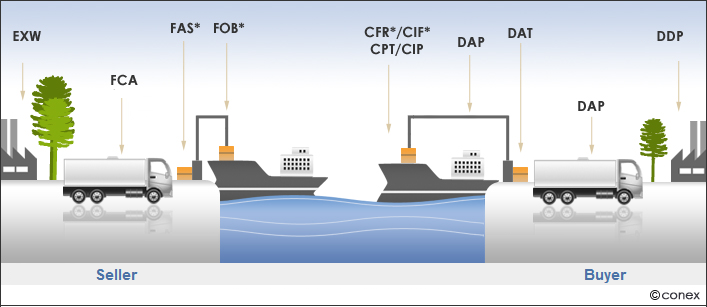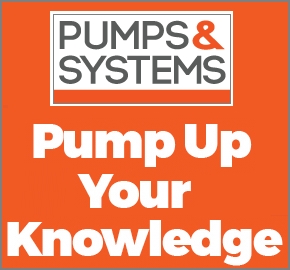RL Blogs

By Simon Jacques
Apr 27, 2020Simplifying how oil traders make deals on various freight transactions terms. |
||||||||||||
| Have you ever wondered about the meaning of commodity trading terms, or Incoterms? FOB…DES…DDP. Say What?!?
Incoterms were established by the International Chamber of Commerce (ICC), a non-governmental organization, to standardize the interpretation of major trade terms.
Sales contracts using Incoterms define the obligations and risks of both the seller and the buyer. The obligations cover the period while the merchandise is in transit, whether by land, sea, air or a combination of modes.
Incoterms are divided into four categories:
The listing below summarizes the various Incoterms used today and the responsibilities of the selling and purchasing party.
CFR: Cost and Freight
Means that the seller must pay the costs and freight necessary to bring the goods to the named port of destination. The risk of loss or damage to the goods, as well as any additional costs due to events occurring after the time the goods have been delivered on board the vessel, is transferred from the seller to the buyer when the goods pass the ship’s rail in the port of shipment.
CIF: Cost, Insurance and Freight
Means that the seller has the same obligations as under CFR but with the addition that he has to procure marine insurance against the buyer’s risk of loss or of damage to the goods during the carriage. The seller contracts for insurance and pays the insurance premium.
CIP: Carriage and Insurance Paid
Means that the seller has the same obligation as under CPT, but with the addition that the seller has to procure cargo insurance against the buyer’s risk of loss of or damage to the goods during the carriage.
CPT: Carriage Paid To
Means that the seller pays the freight for the carriage of the goods to the named destination. The risk of loss of or damage to the goods, as well as any additional costs due to events occurring after the time the goods have been delivered to the carrier, is transferred from the seller to the buyer when the goods have been delivered into the carrier’s custody.
If subsequent carriers are used for carriage to the agreed destination, the risk passes when the goods have been delivered to the first carrier.
DAF: Delivered At Frontier
Means that the seller fulfills his obligation when the goods have been made available, cleared for export, at the named point and place at the frontier, but before the customs border of the adjoining country.
The term “frontier” may be used for any frontier including that of the country of export. Therefore, it is very important that the frontier in question be precisely defined by always naming the point and place in the term.
DAP: Delivered at Place
Seller is responsible for arranging carriage and for delivering the goods, ready for unloading from the arriving conveyance, at the named place.
Risk transfers from seller to buyer when the goods are available for unloading; so unloading is at the buyer’s risk. The buyer is responsible for import clearance and any applicable local taxes or import duties.
This rule can often be used to replace the Incoterms 2000 rules:
DAP can be differentiated from Delivered At Terminal (DAT), whereby the seller is responsible for unloading.
DDP: Delivered Duty Paid
Means that the seller fulfills his obligation to deliver when the goods have been made available at the named place, in the country of importation. The seller has to bear the risks and costs, including duties, taxes and other charges of delivering the goods thereto, cleared for importation.
DDU: Delivered Duty Unpaid
Means that the seller fulfills his obligation to deliver when he has made the goods available at the named place in the country of importation.
The seller bears the risks and costs involved in bringing the goods thereto (excluding duties, taxes, and other official charges payable upon importation), as well as the costs and risks of carrying out customs formalities. The buyer has to pay any additional costs and to bear any risks caused by his failure to clear the goods for import in time.
DES: Delivered Ex Ship
Means that the seller fulfills his obligation to deliver when the goods have been made available to the buyer on board the ships uncleared for import at the named port of destination. The seller has to bear all the costs and risks involved in bringing the goods to the named port of destination.
DEQ: Delivered Ex Quay (Duty Paid)
Means that the seller fulfills his obligation to deliver when he has made the goods available to the buyer on the Quay (i.e. wharf) or at the named port of destination, cleared for importation.
EXW: Ex works
Means that the seller fulfills his obligations to deliver when he had made the goods available at the premises (i.e. factory, warehouse, etc.) to the buyer. In particular, he is not responsible for loading the goods onto the vehicle provided by the buyer or for clearing the goods for export, unless otherwise agreed.
The buyer bears all costs and risks involved in taking the goods from the seller’s premises to the desired destination.
FAS: Free Alongside Ship
Means that the seller fulfills his obligation to deliver when the goods have been placed alongside the vessel on the wharf or in lighters at the named port of shipment. This means that the buyer has to bear all costs and risks of loss or damage to the goods from that moment.
FCA: Free Carrier
Means that the seller fulfills his obligation to deliver when he has handed the goods, cleared by export, into the charge of the carrier named by the buyer at a named place or point. If no precise point is indicated by the buyer, the seller may choose within the place or range stipulated where the carriers shall take the goods into his charge.
FOB: Free on Board
Means that the seller fulfills his obligation to deliver when the goods have passed over the ship’s rail at the named port of shipment. This means that the buyer has to bear all costs and risks of loss or damage to the goods from that point onwards.
Confusingly, a FOB transaction can mean pretty much anything. Depending on which version of Incoterms referenced, pre-2010 and post-2010 FOB definitions can signify different location of risk and payment transfers.
Illustrated below is a comparison of North American FOB usage vs Incoterms.
Now that we have armed you with some useful knowledge, you can be less stupefied the next time a trader blurts out a string of Incoterms.
Note - All definitions above are based according to Incoterms® 2010, the 8th version published by the International Chamber of Commerce (ICC).
To see more from the Trade, Shipping and Finance Wizard visit: | ||||||||||||
|
|










